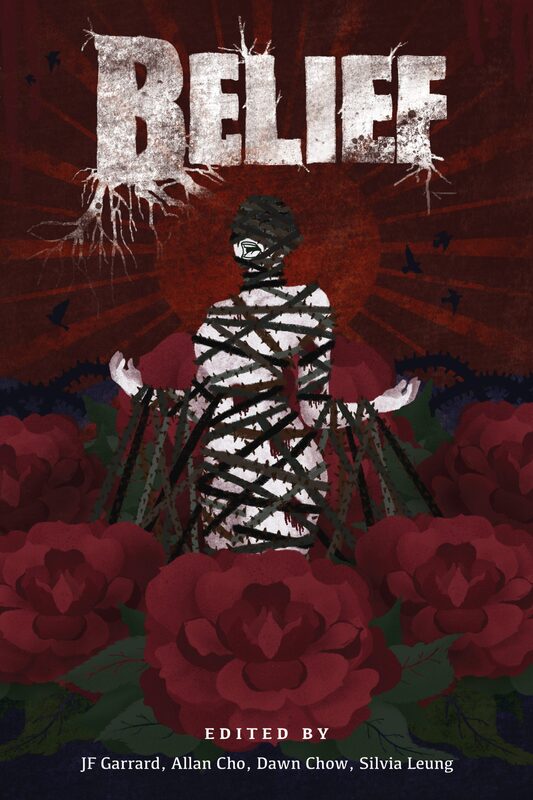|
The Breadcrumbs widget will appear here on the published site.
By Alex Carrigan
Since 1994, Ricepaper Magazine has been publishing the work of Asian-Canadian authors as part of the Asian Canadian Writers Workshop (ACWW). The Vancouver-based organization has collected work into several anthologies, showing the best poetry, fiction, and nonfiction from Asian authors all over the world. In 2021, their newest collected anthology, Belief, has been released. Compiled partially as a response to the COVID-19 pandemic, the anthology (edited by JF Garrard, Allan Cho, Dawn Chow, and Silvia Leung) seeks to show the "beliefs" of the authors featured, whether it be a nonfiction piece about their heritage and identity or prose pieces that examine parts of their culture through a new lens.
Authors in this anthology cover a wide range of Asian cultures, including Chinese, Japanese, Korean, Indonesian, Filipino, etc. It is fascinating to see what themes pop up across the anthology. One of the most common is the theme of family and filial piety. There are many pieces that examine various members of the family unit and how their culture influenced how they act. Some pieces show people who disrupt the conventional family cultural setting, such as in Cindy Phan's "Flesh, Not Blood," where the protagonist disrupts a family reunion dinner by acting more "Western" and refusing to placate herself to her rude elders. Kathy Quyen Pham's "All of Us" shows a wedding gone awry, particularly around how members of the family react when the controversial patriarch makes an appearance, where the traditions of placing him in an honorable position conflict with his family's memory of his abusive past. Other pieces show the sacrifices and duties of various family members. Janika Oza's "Factory" follows a man who has spent the last four years in Canada attempting to make a living to bring his family over despite how difficult that is. Some of the nonfiction pieces examine how the author views their parental figure in a new light after delving into their parent's cultural background, such as Bianca Weeko Martin's "What's in a Name?" or "Personal Taxonomy" by Peter KS Yu. This examination of the family unit and the roles each member plays permeates throughout the collection, and while it may lack nuance in some of the pieces, it's fascinating to see the variations and similarities across the pieces. The collection also features many pieces that examine the immigration story, whether it's from the narrator of the work or for a figure within the story. Aside from some of the above stories, there are pieces that examine the challenges of assimilating into a new country. Christine Wu's "Bilingual Dreams" traces how the narrator lost their connection to their heritage by forgetting their native language. Erica Dionara's "In English" examines how racism and prejudice could cause one to detach from their heritage and native tongue in order to avoid conflict or better fit in. While there are pieces that look at the challenges of adapting to a new environment, there are also that share the value of reconnecting to their roots. Emi Sasagawa's "Between Word and Mouth" examines how the narrator grows more connected to their Japanese heritage as they deal with the passing of their relatives and their visits to Japan to partake in the rituals associated with a person's passing. Nastasha Alli's "Sticky Notes on a Map" follows the narrator as they take a trip to the Philippines and experience a bonding experience that they wouldn't find in in the West. There is an interesting mix of how these experiences shape and influence the authors and narrators of the work, and the collection has enough variety that it never feels like there's one universal experience. There are a few minor gripes with t collection. First, it would have probably benefitted from mixing the pieces together instead of doing all the prose pieces, all the poetry pieces, and all the nonfiction pieces. While this isn't required of collections, mixing the pieces around by theme over style could have helped trace some of the themes better throughout the collection. It's also a very short anthology, just clocking in at over 160 pages. There are a lot of pieces in the collection, but it feels like some could have been expanded further or more pieces could have been included. Of course, that's the sort of thing that is decided in the editorial office and isn't a complete detriment to the collection, but one that maybe could have been considered to ensure there were more voices or that some pieces could have been expanded to better address some of the themes and topics in the collection. Belief is a fascinating collection of Asian Canadian literature, and definitely something that would be of interest for readers looking for more collections from POC authors. There's an interesting variety of work in the collection, and the themes that run throughout are greatly explored to show a wide range of voices. There is always something to be discovered when examining other cultures and backgrounds, and finding these commonalities and differences may shape how we grow with our own beliefs over time.
0 Comments
CommentsYour comment will be posted after it is approved.
Leave a Reply. |
AuthorWrite something about yourself. No need to be fancy, just an overview. Archives
July 2024
Categories
All
|



 RSS Feed
RSS Feed






